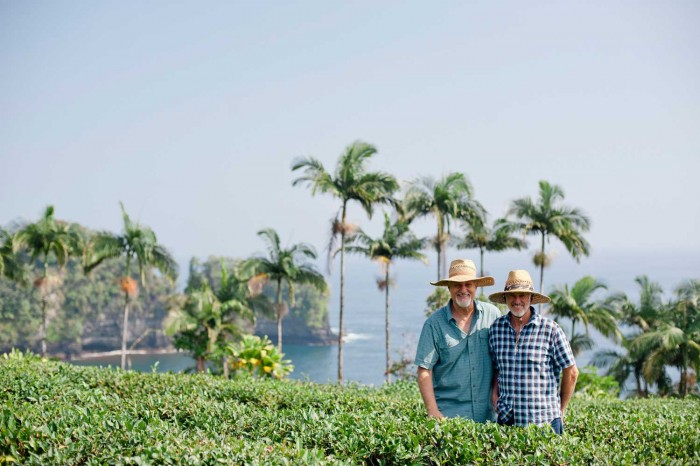For Onomea Tea founders, Mike Longo and Rob Nunally, growing tea became a way to savor a new life on Big Island.
Text by Le‘a Gleason
Images by Megan Spelman
The land that Mike Longo and Rob Nunally call home overlooks Onomea Bay and the Pacific Ocean, with a view spanning to Hilo Bay. Since 1999, the pair have worked to make the sprawling coastal estate, which includes their hardwood house, into the gorgeous property and home that it is today. The lush locale has also become a base for their newfound life project: growing tea.
The concept for the business—which they named Onomea Tea—came about in 2003, when Nunally and Longo were sipping tea at home and contemplating what to do with their acreage.
The purchase of the land four years prior had been the result of a whirlwind romance that began when the two met through mutual friends in California, and a year later, Longo, who had lived in Hilo prior, brought Nunally to the Big Island.
Neither knew much about farming tea, but the Department of Agriculture was giving away seeds, suggesting this might be a good income crop for the climate in East Hawai‘i.

While many experts say that tea grows best at an elevation of about 3,000 feet, it turns out that tea happened to grow mighty fine down at sea level for Nunally and Longo. From only 40 quarter-sized, round, brown seeds, the couple spawned rows upon rows of fertile tea plants, which today line their sloping hillside.
“Tea is consuming. Our whole life, everyday, has something to do with growing the tea or maintaining the business,” Nunally says. “Growing something, harvesting this leaf, and producing a substance that is the number one beverage in the world is quite a fascinating process.”
Nunally and Longo own and operate Onomea Tea with just a few extra hands, and follow a revolving schedule of picking young tea leaves, drying and processing them, packaging the final product, and then pruning the plants. Their tea varietals include plants originating in India—yabukita, yutakamidori, benikaori, bohea—along with several hybrids they have developed on their own.
Along with the varietal, the way the tea is grown can determine its flavor, including factors like the weather between each harvest. “When you pick tea, it’s always exciting,” Nunally says. “Each batch we make is a little unique, just like each plant.”
How the tea is processed also affects the flavor. It can be dried completely, or retain some moisture, which changes the outcome. In fact, green, black, and oolong teas can all be made with the same leaves; it is just a matter of how the leaves are processed. To make green tea, the leaves are heated to about 300 degrees, then “fired” in a large metal machine—somewhat like the drum of a clothes dryer—for 8 to 10 minutes, which stops the oxidation, so that the leaf remains green. To process black tea, oxidation is encouraged, so the leaves are rolled and left to sit, then dehydrated. Oolong tea is oxidized to a range that falls in between the two. For Onomea Tea, all of these processes take place on the farm, with leaves grown on-site.
In November 2015, the national competition Tea of the United States held its first awards contest, in Volcano. Out of 79 teas judged—representing 10 states—Onomea Tea won six awards: first and third place for green tea, second and third for oolong, and second and third for black tea. It was recognition that Longo and Nunally have perfected the process, from growing to finishing, and made it their own.
For the duo, tea in all its forms has become not only a lifestyle, but a life motto for taking things slow. “We really do have a kind of a charmed life,” says Longo, who likens overexertion to attempting escape from a Chinese finger trap—the more you fight, the harder it is to break free. “Effort is the enemy. Just relax and let things go. Put in your energy, but do it in a relaxed way. … Acceptance is what it comes down to.”
Onomea Tea offers tours and tastings, as well as tea processing classes, at its Big Island property. For more information about taking a tour or class, or to order tea, visit onotea.com.


